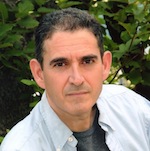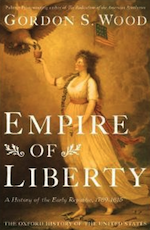 Winner of the prestigious Audie Award for his recording of EMPIRE OF LIBERTY by Gordon S. Wood, veteran actor Robert Fass is equally at home in a wide variety of styles, genres, characters and dialects. He has given voice to modern and classic fiction writers alike, including Ray Bradbury, Joyce Carol Oates, Isaac Asimov, Jeffery Deaver and John Steinbeck, plus nonfiction works in history, health, journalism and business. Here, Robert discusses why narrating audiobooks is so meaningful to him, as well as the challenges and thrills of connecting to even the most difficult material --- including getting into the mind of a serial killer!
Winner of the prestigious Audie Award for his recording of EMPIRE OF LIBERTY by Gordon S. Wood, veteran actor Robert Fass is equally at home in a wide variety of styles, genres, characters and dialects. He has given voice to modern and classic fiction writers alike, including Ray Bradbury, Joyce Carol Oates, Isaac Asimov, Jeffery Deaver and John Steinbeck, plus nonfiction works in history, health, journalism and business. Here, Robert discusses why narrating audiobooks is so meaningful to him, as well as the challenges and thrills of connecting to even the most difficult material --- including getting into the mind of a serial killer!
Question: What do you love about narrating audiobooks?
Robert Fass: It ties together many of my skills and interests as an artist --- acting, oral interpretation, directing, improvisation and music. I’m also a writer, and it feeds my love of literature and language, of storytelling and of imagination. I love being part of a terrific community of artists, men and women who narrate, direct, engineer, edit, produce and distribute audiobooks. My father was a volunteer reader for the blind and visually impaired for over 25 years, and I began doing the same thing in his honor when he passed away. That led me over time into professional audiobook narration, and I love that I can continue to pay tribute to his efforts in my own work.
Q: What has narrating audiobooks taught you about yourself?
RF: Narrating audiobooks has taught me to be aware of when I am present and when I am not. It’s a similar feeling to what I used to experience in the darkroom as a photographer printing my work. The proof is in the result. It’s also taught me patience; endurance; how to connect emotionally with my material; how to get through a task when it’s not as rewarding as the last one. And that my mouth and stomach can at times be very noisy indeed.
Q: How do you prepare for a recording session?

RF: The material: Read it, understand it. Research the pronunciation for any terms I don’t know. For fiction, make a character list, noting whatever descriptive attributes are supplied by the text, and then make choices for how to find them vocally.
Me: Hydrate. Lots of water, minimal caffeine and alcohol a couple of days prior to beginning. Avoid dairy. Warm up physically and vocally. I have a lengthy series of vocal warm-ups I do prior to a session. I keep a hot cup of Throat Coat tea and a glass of warm water on my desk, along with a couple of throat sprays I like. I try to clear the decks as much I can in terms of outside communication (emails, Twitter, etc.) before I step into the booth, and mute all devices in my studio environment. Quickly review the pages I’m about to read to remind myself of the emotional entry point, the narrative arc and, most importantly, the author’s voice.
Q: Is it important for you to connect emotionally with the material you are reading? Do you have interaction with the author?
RF: Generally it is very important for me to connect emotionally with the material. Obviously that’s easier in some instances than in others...I once narrated a series of stories --- brilliantly written, by a great author --- from the point of view of a number of psychopathic, even repellent, individuals; to connect emotionally with a serial killer is an example of the challenges as well as thrills of the narrator’s job. You can take the ride, then leave the psycho behind in the studio, go home and take a shower. My level of interaction with the author varies from project to project and publisher to publisher. I’ve been lucky to have been able to work closely at times with an author and, for me, it is a great help in finding the emotional core of a book.
I’ve had a handful of experiences where I felt strongly connected to the material and, through it, the writer. It often happens when narrating memoirs, no doubt because they are written in the first person and the text is imbued with the author’s true and immediate emotional responses. SAY HER NAME, the beautiful, powerful autobiographical novel by Francisco Goldman, is a recent example. Like him, I didn’t fall in love and get married until my late 40s, and I felt like I understood a lot of the discovery that comes with that. I also had spent time in most of the primary locales Goldman describes in the book. I had not experienced the same devastating loss that he suffered and eventually wrote about, but his genius, his absolute command of language, carried me strongly to a place where the painful losses I have suffered in my own life were available to me as emotional underpinning for telling his story. Of course it’s important to keep a handle on those emotions so it doesn’t become about YOU; while as narrators we are certainly interpreting a text, our primary job is to get out of the way and let the author speak through us.
Q: Are there particular words that you consistently stumble over?
RF: I’m not terribly fond of the word “judiciary” when it appears multiples times in a paragraph. But for me it’s much more often combinations of phonemes that catch me. If there’s a triple-“n,” such as “...in an inanimate object...”, I can spend five minutes getting through it. But it can also depend on where it falls in the sentence or in the breath. Or on how late in the day it is. Recently I was rendered temporarily insane by the phrase, “...Years later, Reeve Lindbergh would write...” With that running start, I just couldn’t turn the corner between “Lindbergh” and “would.”
Q: Do you like to listen back to your own narration?
RF: I do listen back to most of my narrations once they’re finished. I’m always looking to get better, and listening helps me to spot where I’m successful and where I’m not. Do I like to listen back? That’s a separate question. Not always.
Q: What narrators do you admire?
RF: Too many to list! I admire anyone who consistently brings their craft, literacy, emotion, intelligence, dedication and love of their art to this work.


